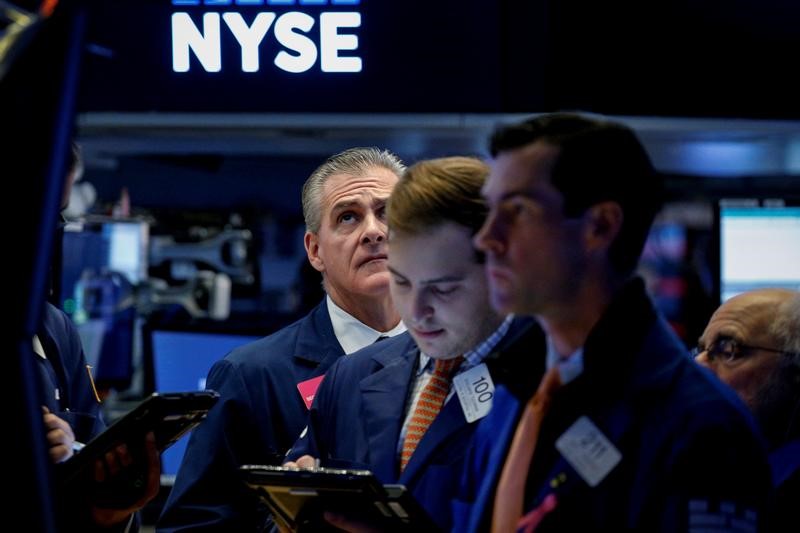* U.S. tariff increase on Chinese goods takes effect
* Wall St falls but investors hold out hope for trade deal
* Oil down slightly, dollar index falls (Updates after U.S. market open, adds commentary, changes byline, previous dateline LONDON)
By Sinéad Carew
NEW YORK, May 10 (Reuters) - Wall Street's indexes fell along with bond yields on Friday after the United States raised tariffs on Chinese goods, but investors' hopes for a deal capped losses.
In U.S. Treasuries, longer-dated yields were hovering at five-week lows as worries about trade tension between China and the United States created demand for safety while data showed that domestic inflation remained tame. President Donald Trump's tariff increase to 25% from 10% on $200 billion of Chinese goods kicked in on Friday, and Beijing said it would strike back. top U.S. and Chinese negotiators were still in talks to reach a deal to end a trade war between the world's two largest economies that has lasted nearly a year. tariffs have kicked in but they haven't walked away from the table. That's the big negative the market will react to if that happens, "said Randy Frederick, vice president of trading and derivatives for Charles Schwab (NYSE:SCHW) in Austin, Texas, who noted that the S&P 500's 2.5% drop over the last four days priced in the implementation of tariffs. It would likely be a month or so before investors understand the economic impact of the tariffs, he said.
"We could see deterioration in economics in next weeks, months if the tariffs stay in place," Frederick said.
The Dow Jones Industrial Average .DJI fell 311.56 points, or 1.21%, to 25,516.8, the S&P 500 .SPX lost 40.86 points, or 1.42%, to 2,829.86 and the Nasdaq Composite .IXIC dropped 136.90 points, or 1.73%, to 7,773.68.
The pan-European STOXX 600 index .STOXX rose 0.13% and MSCI's gauge of stocks across the globe .MIWD00000PUS shed 0.71%.
Not everybody was optimistic about trade prospects.
"To believe that a deal can be sealed in a couple of weeks and that matters won't escalate any further before we get there seems like wishful thinking," said Marios Hadjikyriacos, investment analyst at online broker XM.
UBS Wealth Management cut its exposure to emerging market stocks late Thursday, changing its portfolio as the intensification of trade tensions took its toll on markets, the asset manager said in a note. Treasuries, benchmark 10-year notes US10YT=RR last rose 1/32 in price to yield 2.4547%, compared with 2.457% late on Wednesday.
The 30-year bond US30YT=RR last rose 2/32 in price to yield 2.8781%, compared with 2.881% late on Wednesday.
"Now past the shock that trade negotiations are no longer on schedule, investors will have to rely on private economists to develop new forecasts of the economic impact of tariffs or new goals for U.S.-China trade," said Jim Vogel, interest rates strategist at FTN Financial in Memphis, Tennessee.
The dollar index .DXY fell 0.24%, with the euro EUR= up 0.27% to $1.125.
The Japanese yen strengthened 0.25% versus the greenback to 109.53 per dollar FRX/
Oil prices edged up but were still set to decline for the week, as support from supply concerns were countered by U.S. China trade tensions, which could hurt global demand. Texas Intermediate (WTI) crude CLc1 futures fell 8 cents to $61.62 a barrel, a 0.1 percent decline. Brent crude LCOc1 futures rose 7 cents to $70.46 a barrel, a 0.1 percent gain by 1435 GMT.
Emerging market stocks rose 0.18%. MSCI's broadest index of Asia-Pacific shares outside Japan .MIAPJ0000PUS closed 0.36% higher, while Japan's Nikkei .N225 lost 0.27%.
<^^^^^^^^^^^^^^^^^^^^^^^^^^^^^^^^^^^^^^^^^^^^^^^^^^^^^^^^^^^ U.S. Yield Curve
http://tmsnrt.rs/2zUqXiW China-US trade: monthly figures
https://tmsnrt.rs/2Lzed8e
^^^^^^^^^^^^^^^^^^^^^^^^^^^^^^^^^^^^^^^^^^^^^^^^^^^^^^^^^^^>
